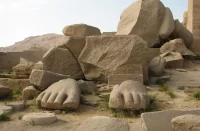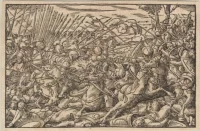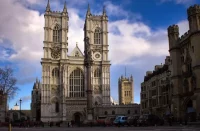Understanding Pascha
In recent months I have come to the conclusion that the best place to understand the significance of Pascha is in a cancer ward, or a hospice for the dying, or by a deathbed. When one stands in any of these terrible places, one enjoys an immunity from the lies of the world. For the world tells each one of us that we are a race of immortals, destined never to die. Surveying our surroundings in these places reveals that this is not so.
Both the cosmetic industry and the funeral industry conspire in their own ways to persuade us that we will remain young and wrinkle-free forever, and our media cheerfully picks up and conveys this message. We know, of course, that it is nonsense, but we buy into it anyway. Youth is celebrated and culturally portrayed as if it is eternal, and the dead are rarely allowed to be seen. People expire privately in hospital rooms, and then are rushed down to the morgue. Funeral directors (there are happy exceptions) do their best to anesthetise the survivors to the horror that is death, and often the corpse is cremated before the funeral (now renamed the “celebration of life”). Often in of these services, the corpse is not present, and if it is, the casket is usually closed. Our forefathers chanted, “In the midst of life we are in death” (the line is from the grave-side service in the Anglican prayerbook), but no longer. In the midst of life we now rarely encounter death. In the old days, people died at home, and were prepared for burial by their loving and grieving family. Now we have people for that.
All of this culture of denial falls away from us when we survey our surroundings in cancer ward, hospice, or by the deathbed. Whether or not we die of cancer, all of us will die. It reminds me of the old children’s riddling rhyme: “Doctor, doctor, will I die? Yes, my child, and so will I.” Our cultural denial notwithstanding, we are not a race of immortals, and all of us will one day lie upon our deathbeds. As a priest, I have stood by a few of them. And then one realizes afresh what Pascha really means.
Pascha is not simply a liturgical feast, something celebrating the end of a rigorous Great Lent. And it is not simply the happy historical ending to our Lord’s life, an appendix added after the crucifixion saying, “And they all lived happily ever after”. Pascha is God’s promise that the moment of pain we endure by the deathbed is not the final word. For now we must be submerged in the horror and obscenity of death, but God’s plan is indeed for us to be a race of immortals, and one day this plan will be fulfilled. Hurtling down the years to our deathbed is not a journey to oblivion but to joy. When death’s cold hand finally closes our eyes, we will open them in paradise, and after our body returns to the dust from which it was taken, it will one day arise and be raised and transformed. Pascha is not simply about Christ’s happy ending, but about ours.
If one disbelieves in Christ and Pascha, then our cultural of denial of death makes good sense. We can’t do anything about the fearful fate which awaits us, so why think about it? Eat, drink, be merry, and watch television. But if what the Church says about Christ and Pascha is true, we don’t need the lies or the denial. We can look death in its fearful face and smile and say with St. Paul, “O death, where is your victory? O death, where is your sting?” Death may prowl the cancer ward or the hospice and may roar at us as we lie on our deathbed, but it will be gone soon enough. Christ is risen from the dead, trampling down death by death, and upon those in the tombs bestowing life.
Pascha: The Blast of a Trumpet
From the prophecies of Isaiah: “It will come about also in that day that a great trumpet will be blown, and those who were perishing in the land of Assyria and who were scattered in the land of Egypt will come and worship the Lord in the holy mountain at Jerusalem” (Isaiah 27:13). The prophet here surveys the world around him, and sees how the people of God were languishing in exile, scattered to the four winds and perishing helplessly in the lands of the mighty superpowers of the day, Assyria and Egypt. Israel was tiny, powerless, unable to lift a finger to help; the superpowers sat invincible on their haughty thrones, intent upon keeping their prey within their grip. But help would arrive, and it would come about that in the day God arose to shake the towers and counsels of the great, He would save His people. A great trumpet would be blown, the signal of deliverance and freedom, a summons for the exiles to arise and be free and come home.
Why a trumpet? Why not (for example) a signal fire, or the waving of a standard? Why a trumpet blast, and what did the blast of a trumpet mean to Israel? For one thing, it meant the Year of Jubilee. In the Law, every seventh year was a year of release, a year when all the slaves were to be set free (Exodus 21:1), and after every forty-nine years—i.e. seven times seven years—freedom would come to all in the land: “You shall consecrate the fiftieth year and proclaim a release through the land to all its inhabitants. It shall be a jubilee for you, and each of you shall return to his own property, and each of you shall return to his family” (Leviticus 25:10). No matter what had happened by way of poverty or misfortune, whatever the disaster which had forced the poor man to sell his land to pay his debts, once every lifetime, once every fifty years, everyone had a second chance to start over. Everyone could go free, everyone could go home. The downtrodden waited to hear the blast of that jubilee trumpet—and indeed the very word “jubilee” comes from the Hebrew word for “ram’s horn” or “trumpet”. When the Septuagint writers encountered the Hebrew word, they rendered it “signal of release”, αφεσεως σημασια.
That is why the signal for the gathering of the exiles was a trumpet, for God was announcing a worldwide jubilee for His people. Their Assyrian and Egyptian oppressors and debtors might rage all they liked, but His people had been set free and were going home. Every debt was remitted, and every shackle was shattered, every bond, broken.
![]() This prophecy of restoration, like all such prophecies, finds its fulfillment in Christ. He is our Jubilee, the Jubilee of all the world, and His Resurrection is the trumpet which announces it. With the rolling away of the stone from the door of the tomb, a trumpet began sounding which has never ceased to sound. It calls all the exiles home, announcing the forgiveness of every debt, liberation from every bond of sin and death. And not just the Jewish exiles, for Christ died not only for the Jewish nation, “but He that might also gather together into one the children of God who are scattered abroad”, Gentiles as well as Jews (John 11:52). As many in the world whom God taught and who heard the voice of the Shepherd, just as many God would gather into one, “and they shall become one flock with one Shepherd” (John 10:16). It did not matter whether or not one was a great sinner, or bound by shackles of addiction and despair. It did not matter whether or not one lived in the land of Assyria or the land of Egypt—Christ came to forgive and liberate all, and gather the exile safe and sound in His holy flock.
This prophecy of restoration, like all such prophecies, finds its fulfillment in Christ. He is our Jubilee, the Jubilee of all the world, and His Resurrection is the trumpet which announces it. With the rolling away of the stone from the door of the tomb, a trumpet began sounding which has never ceased to sound. It calls all the exiles home, announcing the forgiveness of every debt, liberation from every bond of sin and death. And not just the Jewish exiles, for Christ died not only for the Jewish nation, “but He that might also gather together into one the children of God who are scattered abroad”, Gentiles as well as Jews (John 11:52). As many in the world whom God taught and who heard the voice of the Shepherd, just as many God would gather into one, “and they shall become one flock with one Shepherd” (John 10:16). It did not matter whether or not one was a great sinner, or bound by shackles of addiction and despair. It did not matter whether or not one lived in the land of Assyria or the land of Egypt—Christ came to forgive and liberate all, and gather the exile safe and sound in His holy flock.
What then is our responsibility? Pascha calls us to live like men and women who have heard the blast of a trumpet, who have arisen like those alive from the dead, living in joy. Nietzsche famously said that he would believe in the Redeemer when the Christians looked a little more redeemed. Fair enough: let us live in such a way that all may know that we have been redeemed—living each day in freedom and joy. Formerly we lived like everyone else, helpless and trembling in the shadow of death, debtors to sin in the lands of Assyria and Egypt. But no longer. Now we are going home, our faces radiant with Pascha, the faces of those who have heard the blast of the Jubilee trumpet. Let that trumpet sound in the ears of the weary world, loud enough to wake the dead: Christ is risen!
Source: No Other Foundation














Comments